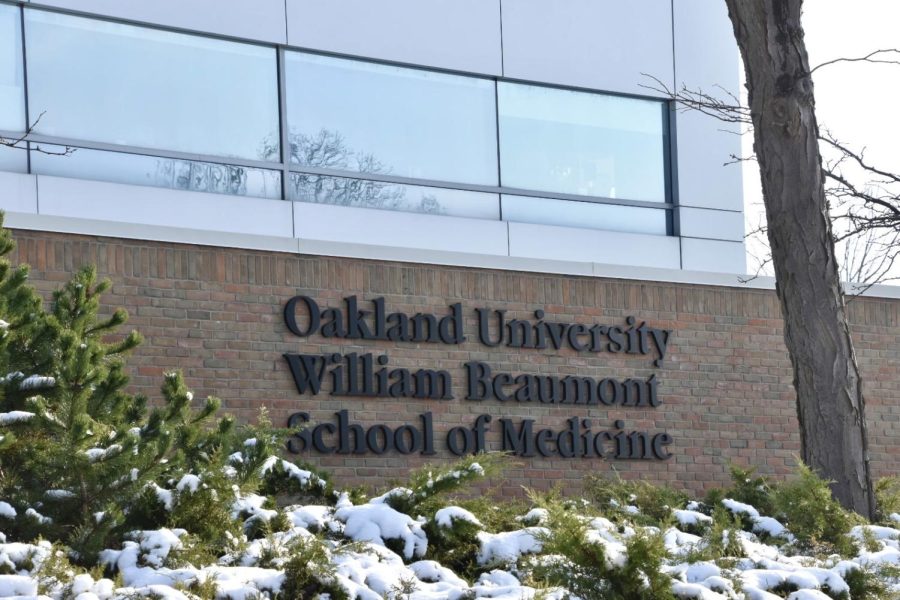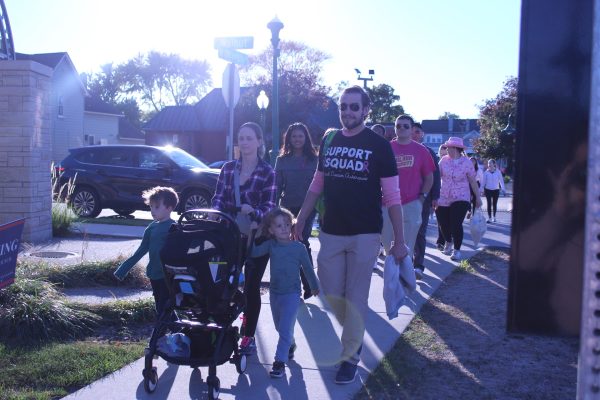OUWB students’ organization nominated for Billion Acts of Peace award
A snowy exterior shot of O’Dowd Hall, home to OUWB.
In Michigan, 1 in 8 people is faced with hunger, totaling out to almost 1,300,000 Michigan residents — including children. The Detroit Food Policy Council reports that roughly 48% of households in Detroit are considered food insecure.
Two students from Oakland University William Beaumont School of Medicine (OUWB) aim to change food insecurity and the food gap in Detroit with their non-profit organization, Detroit Feedback Loop (DFL). The organization has reportedly provided over 50,000 meals to local shelters and soup kitchens in the area.
As a result of their efforts and dedication to “bridging the gap between excess food and hunger,” DFL is a finalist nominee for the 2021 Billion Acts of Peace award — an initiative led by 14 Nobel Peace Laureates showcasing campaigns that bring communities together around an issue or shared goal.
Co-founders Nicholas Ang and Camilla Cascardo started DFL while earning their undergraduate degrees at Wayne State University (WSU) in Detroit. Ang and Cascardo attribute the founding of the non-profit to witnessing excessive food-waste at campus dining locations.
“We were both living on campus and we would go to the cafeterias to eat every meal. We saw that a lot of the food from the cafeteria was being wasted and would go back on the conveyor belts where people would put their plates back to get washed,” Cascardo said. “We thought that was kind of a juxtaposition to all the homelessness we were seeing in Detroit right outside of our campus, and we thought that maybe we could do something about it. “
Ang and Cascardo began by collaborating with the chefs from WSU’s cafeterias, who appreciated the idea of donating prepared food that had been untouched by students to local shelters. Cascardo stated that although the chefs were on-board with the idea, they were weary about the legal aspects that stem from food donations.
“That inspired me and Nick to start an organization where we could take on that legal burden and then be the middle-man to transport the food to the shelters,” Cascardo said. “From there [we] grew and grew and began transporting food — not only from our cafeterias, but from places like Whole Foods, other grocery stores, bakeries and restaurants all around Detroit.”
Ang states that he and Cascardo faced pushback from WSU administration, with about six months going by between the offering of their first donations from WSU and the completion of the administration’s approval process.
DFL has been able to provide donations to several shelters in Detroit, including Detroit Rescue Mission, Detroit Veterans Center and multiple women and children’s shelters.
Both of the co-founders expressed their gratitude and excitement about being nominated for such a highly-regarded award in the field of community impact and acts of peace.
“Hearing all of the other finalists’ and nominees’ stories — it’s pretty incredible,” Ang said. “We’re really honored to have been included in a cohort that’s as impressive as they are.”
Although the organization has only been around since 2017, DFL has done substantial work in providing meals for low-income or homeless individuals in the Detroit area. Ang and Cascardo have big goals for DFL, and hope to encourage engagement from students at WSU and continual awareness of food insecurity in the community.
“The biggest goal […] is creating opportunity for student leadership and getting students engaged in the community,” Ang said. “We really felt like we learned a lot from creating this organization and were able to help a lot of people in the process, but the biggest thing that stuck with us was the knowledge — we are able to see a problem and create a solution where essentially we can attack that problem head-on. We wanted to create a chance for students to have a similar experience and engage with the community surrounding them.”
Cascardo shared an additional goal for the non-profit — to become a recognizable name in the city. She hopes businesses aiming to give donations will feel they can rely on DFL to provide a safe and secure route, and that shelters will recognize DFL as a go-to source for donations.





